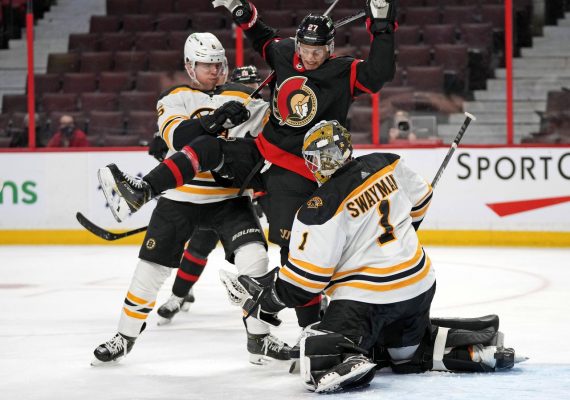
By: Joe Travia | Follow me on Twitter @NHLJoeTravia
I made the joke. You made the joke. We all made the joke. Coming into the game mired in an 0-22 slump with the man advantage, every time the referee’s arm went up to call the Senators for a penalty, fans all had the same thing on their minds. Can we decline the power play?
It felt bad while watching it. It feels even WORSE watching it again. The Bruins finished the night 0-5 on the power play, and at no point during any of these power plays did it really feel like they were threatening whatsoever. Don’t believe me? Take a look for yourself (viewer discretion advised).
So, what exactly is wrong with the power play? The easy thing to point to is injuries. The absence of David Pastrnak on the first unit has been a massive blow. Teams needing to respect his elite one-timer from the left side of the umbrella opens up so much for the top unit. While any team would feel the absence of their top goal scorer, the Bruins are doing themselves no favors either. The film was rife with poor zone entries, forcing passes, and regularly losing the puck battles; you need to win for a successful power play. Let’s take a closer look.
Bad zone entries
The Bruins have a lot of skill on their first power-play unit. Even without Pastrnak, McAvoy/Bergeron/Marchand/Hall/DeBrusk is as good of a five-person unit you will find in the NHL. In theory, that top unit should have no issue getting into the offensive zone and set up to run their power play system, especially against a lowly team like the Senators. In actuality, this is what happened:
These types of zone entries certainly aren’t going to help a struggling power play find its footing again. If you can’t gain entry cleanly and set your power play up, you aren’t going to have any success. Period.
Forcing passes
In the event that the Bruins are getting into the offensive zone cleanly and starting to work, their passing has been either very forced or just downright careless. Some examples:
Losing puck battles
It goes without saying, but winning puck battles is immensely important to a successful power play. The longer you can possess the puck in the offensive zone, the more tired the opposing defenders will get, leading to prime scoring chances. You have one more skater on the ice than the defending team; you need to dedicate as many as possible in order to keep possessions alive.
This isn’t Bruins hockey. This is a veteran team who should know better. The Bruins, while definitely full of talented players are squarely in the middle of the league in terms of goals for at even strength. This is a team that is going to need to figure out their power play issues if they want to contend with offensive juggernauts like Florida and Toronto in the playoffs. They would be well served to get back to the basics, and that starts with effort. Don’t make us keep having to make the same joke.


Leave a Reply